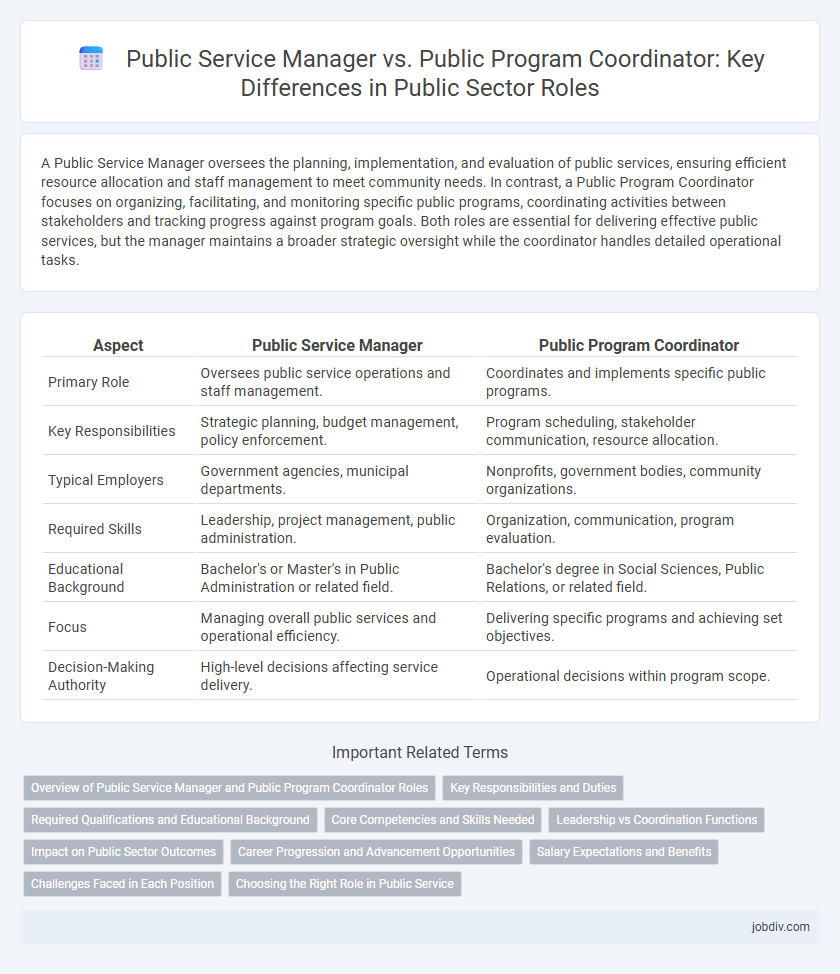A Public Service Manager oversees the planning, implementation, and evaluation of public services, ensuring efficient resource allocation and staff management to meet community needs. In contrast, a Public Program Coordinator focuses on organizing, facilitating, and monitoring specific public programs, coordinating activities between stakeholders and tracking progress against program goals. Both roles are essential for delivering effective public services, but the manager maintains a broader strategic oversight while the coordinator handles detailed operational tasks.
Table of Comparison
| Aspect | Public Service Manager | Public Program Coordinator |
|---|---|---|
| Primary Role | Oversees public service operations and staff management. | Coordinates and implements specific public programs. |
| Key Responsibilities | Strategic planning, budget management, policy enforcement. | Program scheduling, stakeholder communication, resource allocation. |
| Typical Employers | Government agencies, municipal departments. | Nonprofits, government bodies, community organizations. |
| Required Skills | Leadership, project management, public administration. | Organization, communication, program evaluation. |
| Educational Background | Bachelor's or Master's in Public Administration or related field. | Bachelor's degree in Social Sciences, Public Relations, or related field. |
| Focus | Managing overall public services and operational efficiency. | Delivering specific programs and achieving set objectives. |
| Decision-Making Authority | High-level decisions affecting service delivery. | Operational decisions within program scope. |
Overview of Public Service Manager and Public Program Coordinator Roles
Public Service Managers oversee the strategic planning, implementation, and evaluation of government initiatives, ensuring compliance with regulations and efficient resource allocation. Public Program Coordinators focus on managing specific projects or programs within public agencies, coordinating activities, monitoring progress, and engaging stakeholders to meet defined objectives. Both roles require strong leadership and communication skills but differ in scope, with Managers handling broader organizational strategies and Coordinators managing program execution.
Key Responsibilities and Duties
Public Service Managers oversee the strategic planning, development, and implementation of public policies and programs, ensuring compliance with regulations and managing teams to deliver community services effectively. Public Program Coordinators focus on organizing, coordinating, and monitoring specific public initiatives, handling budget management, stakeholder communication, and performance evaluation to achieve program objectives. While managers emphasize leadership and policy oversight, coordinators specialize in operational execution and program logistics within public sector projects.
Required Qualifications and Educational Background
Public Service Managers typically require a bachelor's degree in public administration, political science, or a related field, along with several years of managerial experience in public service. Public Program Coordinators often hold a bachelor's degree in social work, public health, or a related discipline, emphasizing program implementation skills and community engagement. Advanced degrees such as a Master of Public Administration (MPA) can enhance qualifications for both roles, with certification in project management or specific public sector expertise further strengthening candidate profiles.
Core Competencies and Skills Needed
Public Service Managers excel in leadership, strategic planning, and policy implementation, requiring strong decision-making, communication, and budget management skills. Public Program Coordinators focus on program development, coordination, and evaluation, emphasizing organizational skills, stakeholder engagement, and data analysis. Both roles demand proficiency in project management, teamwork, and a deep understanding of public administration principles.
Leadership vs Coordination Functions
Public Service Managers emphasize strategic leadership, overseeing teams and directing resources to achieve organizational goals, while Public Program Coordinators focus on operational coordination, ensuring program activities run smoothly and meet deadlines. Managers develop policies, make high-level decisions, and manage stakeholder relationships, whereas coordinators handle day-to-day logistics, monitor progress, and facilitate communication among participants. Leadership in public service involves vision-setting and resource allocation, contrasting with the coordinator's role in executing plans and maintaining program flow.
Impact on Public Sector Outcomes
Public Service Managers drive strategic decision-making and resource allocation, significantly enhancing efficiency and effectiveness in public sector outcomes. Public Program Coordinators implement and monitor specific initiatives, ensuring programs align with community needs and policy objectives. Both roles contribute to improved service delivery, but managers typically influence systemic change while coordinators focus on operational success.
Career Progression and Advancement Opportunities
Public Service Managers typically oversee multiple projects or entire departments, providing strategic leadership and higher-level decision-making responsibilities, which often positions them for executive roles within government agencies. Public Program Coordinators focus on managing specific initiatives and ensuring operational efficiency, offering a solid foundation for advancement into managerial positions through skill development in program execution. Career progression from Program Coordinator to Service Manager is common, leveraging gained experience in coordination, stakeholder engagement, and resource management to ascend the public sector hierarchy.
Salary Expectations and Benefits
Public Service Managers typically earn higher salaries than Public Program Coordinators, with average annual wages ranging from $70,000 to $95,000 depending on experience and location, while Program Coordinators usually earn between $50,000 and $65,000. Benefits for both roles often include health insurance, retirement plans, and paid leave, but Public Service Managers may receive enhanced perks such as performance bonuses and executive allowances. Salary expectations vary significantly based on government level, agency size, and job complexity within the public sector.
Challenges Faced in Each Position
Public Service Managers often confront challenges such as navigating bureaucratic hurdles, managing large teams, and ensuring compliance with complex regulatory frameworks. Public Program Coordinators face difficulties in coordinating multiple stakeholders, aligning program objectives with community needs, and managing limited resources within strict budgets. Both roles demand strong problem-solving skills, but the Manager role emphasizes strategic oversight while the Coordinator role requires tactical execution.
Choosing the Right Role in Public Service
Public Service Managers oversee government operations and ensure policies are implemented efficiently, while Public Program Coordinators focus on organizing and managing specific community initiatives. Selecting the right role depends on whether you prefer strategic leadership and broad oversight or hands-on project management and direct stakeholder engagement. Understanding these distinctions helps align career goals with the dynamic needs of public service organizations.
Public Service Manager vs Public Program Coordinator Infographic

 jobdiv.com
jobdiv.com